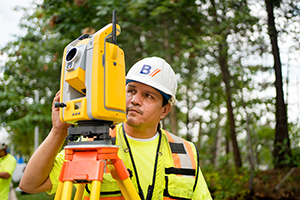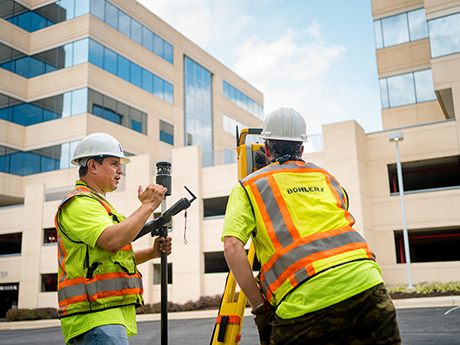Due diligence — particularly land surveying — can be a slow, cumbersome process if a project lacks strong guidelines based on the owner or developer’s particular needs. It can be easy to overprepare for the wrong site or underprepare for the succession of steps needed for the right site.
REBusiness spoke to two land surveying experts, Billy Logsdon, divisional director of surveying, and Tom Teabo, associate and regional survey manager. Both work for Bohler, a land development consulting and site design firm, and both have strong insights on how to incorporate each step in the due diligence process elegantly within a well-planned approach.
Due diligence such as American Land Title Association (ALTA) surveys and gathering topographic information can be time-consuming and expensive steps — making it beneficial to fit their timing into the larger project in a way that reflects the client’s needs — from the purchase of land to development completion. Logsdon and Teabo highlight the importance of streamlining the survey process and getting owners and developers better results based on their desired outcomes, often starting with the information already available about the site early in the process.

Bohler
REBusiness: What is slowing down survey due diligence, in your experience, and do you expect these factors to change anytime soon?
Teabo: Due diligence in the commercial real estate industry involves evaluating the feasibility of developing a property and ensuring it has a clear title, among other crucial aspects. One of the main factors slowing down survey due diligence is the scarcity of skilled staff — a surge in work and a backlog of projects have stretched available resources thin across the industry.

Bohler
Logsdon: The main factor we see slowing down due diligence is developers ordering surveys too late in the process. They often hesitate to spend money on surveys until the last possible moment, causing delays in scheduling and execution. Additionally, municipalities, especially in larger cities, can be bottlenecked during the planning phases, which further contributes to delays. These factors are unlikely to change anytime soon, as city review timelines are often fixed and developers will probably continue their cautious approaches to upfront spending.
REBusiness: What are the benefits of knowing the purpose of a survey before beginning a project?
Teabo: The purpose of a survey significantly impacts the level of detail and data required. For preliminary due diligence, a boundary survey coupled with geographic information system (GIS) topography can often suffice. However, if a client plans to develop the property or requires more comprehensive information for the sale, an ALTA survey with topographic information becomes essential. Knowing the purpose allows us to tailor the survey to meet specific needs, saving time and costs for the client.
Logsdon: If the client intends to develop on the site, additional steps such as setting control points or benchmarks may be taken to aid future construction efforts. Understanding the purpose of the survey helps in optimizing the survey process.

REBusiness: Can you elaborate on the benefits of an ALTA survey without topographic information, where topographic information is collected later?
Teabo: When clients need an ALTA survey for a property sale but do not require topographic information immediately, we can save costs by providing just the ALTA survey at first. This approach ensures that the property’s boundaries, encumbrances and other critical elements are well-documented. Later, if the client decides to develop the property, we can return to the site and collect the required topographic information. This step-by-step process allows clients to be cost effective while still obtaining crucial survey data.
Logsdon: An ALTA survey without topographic information can be beneficial if the project’s feasibility is uncertain. However, for projects likely to move forward, doing both the ALTA survey and the topographic survey together can save time and costs as it streamlines the process and avoids duplicating efforts in the field.
REBusiness: What does an “office-only” survey entail, and how does Bohler use the company’s extensive records and data to make this step more comprehensive?
Logsdon: An “office only” survey involves using existing records and data without a physical visit to the site. Its utility is typically limited to verifying existing boundary data or reconfirming previous survey measurements.
Teabo: Bohler leverages its access to comprehensive GIS information and data from various agencies to compile accurate property information. By creating a CAD file with collected deeds and maps of record, we can advise clients on potential boundary issues or gaps without necessarily performing an on-site survey. This approach allows us to offer initial insights to clients efficiently.
Logsdon: However, while Bohler does have extensive records and data on many sites, reusing the data from a previous survey for a new client may require additional verification and research to ensure its accuracy. Therefore, the level of comprehensiveness in an “office only” survey depends on the availability and reliability of existing data. Walking the site itself is essential to help flag issues that records don’t encompass.
Teabo: And we’re doing not just property or survey due diligence for our projects. We’re involved in the political due diligence. Part of the job is talking to the town — does the community want them to widen the road or put up a traffic light down the street? The most streamlined approach is when you’re already campaigning for this property before the client even purchases it. That’s how deep the due diligence goes.
REBusiness: Are there instances where it makes sense to move ahead with certain due diligence steps while holding others until later?
Teabo: Absolutely! The due diligence process can be tailored based on the client’s needs and the property’s complexity. Starting with a preliminary sketch and boundary survey can provide a quick overview. If the property looks promising, the client may proceed to a more comprehensive ALTA survey and additional surveys like wetland or tree surveys. This step-by-step approach saves costs for clients by avoiding unnecessary surveys for properties that might not be viable for development.
The trade-off between expedited information and certification lies in the level of detail and assurance required for a survey. Expedited information, such as boundary verification or partial surveys, may be suitable for clients who need quick results and are willing to rely on existing data without full certification. On the other hand, certified surveys provide a higher level of assurance, including field visits, exhaustive research and certification by surveyors. Depending on the project’s urgency and budget constraints, clients can choose between faster, cost-effective options and more comprehensive, certified surveys.
REBusiness: How do you work with in-house engineers to save time, cost and hassle?
Teabo: At Bohler, our surveying team becomes an integral part of our clients’ teams. By working closely with our in-house engineers and other experts, we create seamless collaboration throughout the due diligence process. Having surveyors and engineers in-house facilitates real-time communication, quick issue resolution and efficient data sharing. This streamlined approach helps avoid delays and ensures that the project moves forward smoothly.
Logsdon: Agreed. This collaboration enables our team to share ideas and best practices, optimize workflows and efficiently meet client deadlines. Additionally, the in-house survey team can quickly adjust schedules and allocate resources as needed, ensuring a smoother project execution and faster delivery.
REBusiness: How is Bohler fostering collaboration between its survey teams and optimizing the survey process?
Teabo: By building a team of skilled professionals who have been with us for years and who we’ve trained from within, we maintain a cohesive and collaborative environment. Our surveyors and engineers work together seamlessly, using the latest technology and tools to maximize efficiency and accuracy.
— Bohler is a content partner of REBusinessOnline. For more articles from and news about Bohler, click here.


